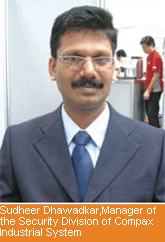Are Korean, Chinese and Taiwanese companies meeting the demand for converged solutions? Are their products more cost-effective than those from the West? Buyers share their viewpoints here.
Are Korean, Chinese and Taiwanese companies meeting the demand for converged solutions? Are their products more cost-effective than those from the West? Buyers share their viewpoints here.
"Demand for integrated solutions is not being met by supply yet," said Danny Agapay, Technical Manager of the Philippinesˇ Circuit Solutions, "and different products are still needed to make up one solution." Joseph Zhou, Business Development Executive for Sin Chew Alarm, agreed. "In Singapore, price sensitivity is still a consideration. Convergence may be a growing trend, but when end users find that products bought separately and integrated by an experienced installer offer better value, they often go for the cheaper solution offered by a smaller company than the holistic solution offered by a multinational." End users should ensure that the integrator is carefully chosen, though, as the majority of installers do not take the time to educate the end user  about all that is available on the market; or about the benefits of choosing quality products over cheaper products, which would help combat the unhelpful and often inaccurate equating of Asian products with low value.
about all that is available on the market; or about the benefits of choosing quality products over cheaper products, which would help combat the unhelpful and often inaccurate equating of Asian products with low value.
There is interest in India in solutions using facial recognition integrated into IP surveillance systems for remote surveillance, said Sudheer Dhawadkar, Manager of the Security Division of Compax Industrial Systems. China, Taiwan and Korea have the hardware but arenˇt good regions for sourcing integrated solutions. "Indian software then comes into play once the required hardware is available."
Tenders in Italy tend to have specs for equipment that is easy to integrate, said Aldo Punzo, Product Marketing Manager for Milan-based Bettini Srl, such as for speed domes and video servers. Convergence is happening in hospitals such as Palermo's Villa Sofia Hospital, at ports, at city surveillance centers, and at express carriersˇ warehouses, among others. It remains to be seen how fast  Asian companies can meet this demand. "Keep in mind that convergence is only feasible in high end or large scale installations, though. In most surveillance installations, the particular features of the cameras is still the top priority."
Asian companies can meet this demand. "Keep in mind that convergence is only feasible in high end or large scale installations, though. In most surveillance installations, the particular features of the cameras is still the top priority."
Where is Convergence Really Happening?
"The main convergence is actually that which is taking place in cards," said Daniel Brami, owner of Paris-based Alternative Solution. "The cost of a new installation is found not in the products but in the cabling. The MIFARE card is changing the way access control is consumed. Data can be written on the card, and this data gets transferred to the reader when the two are first in contact. Everything is done wirelessly; and applications range from security to payment to activation of office equipment. Wireless allows the security team to be notified of my presence as soon as I enter the office, and at the same time have offline applications (on a different database) for less secure doors. French users are clamoring for solutions which offer both online access from the exterior and offline internal door control which requires easy installation and no cabling."
M&As will accelerate as companies seek to acquire companies which will widen their offers to encompass both online and offline solutions. Spanish companies are some of the first to show this trend. Taiwanese companies are working on developing these solutions, while Korean companies are focusing their convergence on fingerprint access control. However, vendors partnering with Asian companies should protect themselves by signing an agreement that will protect them in case their Asian partners sell to a bigger company.
Long-term vs. Short-term Gains
"China alone has millions of potential security consumers. Asian products aren't cheaper because of their quality, the common misconception; but because when you have a high ROI, your costs can be lower compared to those of a company with a lower ROI." Furthermore, the price difference between manpower in the East and manpower in the West belies the true power of the Asian industry, as the employment field will eventually level. Additionally, many North African countries have sizable manufacturing plants producing goods for the security and other industries. Manpower in North Africa is comparable to Asian countries'; and it is much nearer for French buyers. Shipping from these regions is also quicker. One can even buy cheaper products in Germany from a company which is manufacturing in India.
"The endemic view that an Asian product is likely to be of poorer quality is something that should be countered. It is ironic that the exact same product can have better reception when being offered by a European than by an Asian company, even though the European seller may not have improved the product at all. A zero-defect product's selling price should reflect its quality, not the origin of the company offering it. Users immediately expect cheaper prices from an Asian company than from a Western one, even when often the former has a better quality product than the latter."
This will become a problem as the gap in value between the Chinese RMB and the US dollar becomes narrower and the RMB is reevaluated. In fact, some Chinese companies have already started pricing their solutions in Euros for their E.U. partners. This, added to the fact that many Western companies attempt to hide the Asian origin of their sources, will create another gap between what users expect and what they get; when an end user comes across the OEM in Asia, issues arise. Pricing in Euros is also more beneficial to both parties as the European buyer saves on cost of converting from RMB to dollar and from dollar to Euros, and the supplier is assured of fixed prices which do not fluctuate with the dollar.
"Asian companies shouldn't be known for their low cost products, but for their high-tech solutions. They can lower costs because they do not have to shoulder a considerable legacy or burden they can jump directly onto new technology. Western players arenˇt drawn to Asian solutions simply because of price Asian companies are offering far more palatable attractions. Lastly, when buying from an Asian company, the final price is not the one at which I am buying, but the price at which I am insuring my shipment. In the end, an Asian supplier isn't that much cheaper than its European counterpart."
Limitations
Most Asian DVRs do not offer software capabilities, said Punzo, forcing Italian banking vertical suppliers, for example, to partner with non-Asian vendors. In fact, M&As are ostensibly taking place between distributors of surveillance systems and DVR manufacturers. Asian companies are also not as good as Western ones when it comes to providing warranties and clear documentation. For example, obtaining manuals in Italian plays a part in choice of suppliers.